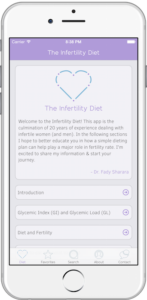The Infertility DietTM
 First, I must confess that I am not a dietitian, nor a nutritionist. The Infertility DietTM is the culmination of 20 years of experience dealing with infertile women (and men). I realized early in my obstetrics and gynecology training, and subsequent fellowship in reproductive endocrinology and infertility, the importance of diet in the genesis of ovulatory problems, especially in women suffering from polycystic ovarian syndrome (PCOS). Women with PCOS do not ovulate regularly, and some not at all, and have higher male hormones (androgens) along with acne, oily skin, hair growth, among other symptoms. Many are pre-diabetic or diabetic, some have high blood pressure, and elevated Cholesterol and triglyceride values. About 70% of women with PCOS are overweight or obese but a common characteristic of these women is the high carbohydrate intake, especially refined carbohydrates, and the development of insulin resistance.
First, I must confess that I am not a dietitian, nor a nutritionist. The Infertility DietTM is the culmination of 20 years of experience dealing with infertile women (and men). I realized early in my obstetrics and gynecology training, and subsequent fellowship in reproductive endocrinology and infertility, the importance of diet in the genesis of ovulatory problems, especially in women suffering from polycystic ovarian syndrome (PCOS). Women with PCOS do not ovulate regularly, and some not at all, and have higher male hormones (androgens) along with acne, oily skin, hair growth, among other symptoms. Many are pre-diabetic or diabetic, some have high blood pressure, and elevated Cholesterol and triglyceride values. About 70% of women with PCOS are overweight or obese but a common characteristic of these women is the high carbohydrate intake, especially refined carbohydrates, and the development of insulin resistance.
This diet however applies to a much broader audience than women with PCOS, and I recommend it to all my patients, especially those who consume more simple carbohydrates and processed foods. Virtually all infertile women (and men) can improve their metabolic, and possibly reproductive, systems by following this diet. I believe that by eating healthier, and eliminating the metabolic swings that occur with the consumption of the typical high sugar-processed food “American” diet, and the influx of high amounts of natural anti-oxidants and micronutrients, a higher chance at conception is the logical result.
Anthelme Brillat-Savarin (1755-1826) wrote in his famous “Physiology of taste” published in 1825: ‘Tell me what you eat and I will tell you who you are”. We are indeed what we eat! Once hopefully pregnant, what you eat during your pregnancy not only affects your health but also the future health of your child (or children). There is a growing body of evidence that what you eat can predispose your children to a variety of diseases, from childhood obesity to diabetes, cancers, immunologic problems, and possibly autism. Women (as usual) have to carry a heavier load: their diet during pregnancy and what they raise their children (and their husbands) to eat at home have untold consequences on their families’ health and wellbeing. Feed them healthy and reap the rewards.
For those of you who need to lose weight, The Infertility DietTM (TID) does wonders (and works very well for anyone interested in losing weight). You will no longer feel hungry in just 2-3 weeks. TID is not just a Fertility diet, but a lifestyle change for the better, and hopefully a guiding way to enjoy healthy and nutritious foods for the rest of your (hopefully long and healthy) life.
You can download The Infertility DietTM from the App Store at: https://appsto.re/us/cKbl5.i, or through our website: http://theinfertilitydiet.com/


